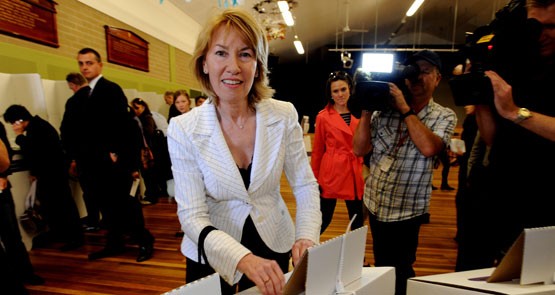
Earlier this month, Deputy Prime Minister and Nationals leader Barnaby Joyce looked visibly shaken by the not-unexpected announcement by Tony Windsor that he would contest New England in the upcoming federal election.
Joyce has since come out declaring his “underdog” status, after Newspoll put him at a 48%-52% disadvantage on a two-candidate preferred basis.
“Unfortunately, that means I claim the mantle as the underdog … Windsor calls me the ‘deputy dog’, but I am thinking of the underdog,’’ said Joyce.
“Deputy Dog”– a reference made by Tony Windsor of Joyce’s recently acquired status as Deputy Prime Minister — would do well to be concerned by the contest in front of him.
Windsor — a former member for New England — retired from politics at the end of June 2013 after having backed prime minister Julia Gillard to form minority government after the knife-edge 2010 election. He is a seasoned and accomplished candidate. He was a particularly influential and effective member of the crossbench between 2010 and 2013, and was a strong advocate for his seat; this, despite the flak that he inevitably attracted from his predominantly conservative electorate for backing Gillard.
During the Gillard prime ministership, Windsor was instrumental in ensuring that the government passed more than 880 individual pieces of legislation while securing significant gains for New England, including an early rollout of the ALP’s fibre-to-the-premises National Broadband Network in the electorate. With some reservations, Windsor also supported Gillard’s highly controversial carbon tax legislation introduced in July 2012.
Windsor could comfortably defeat Joyce in New England based on the Newspoll numbers. There are not many precedents in Australian electoral history for this. A standing Nationals leader and deputy prime minister being unseated at a federal election has happened only once before: Charles Blunt, defeated by the ALP’s Neville Newell in the 1990 federal election. Barnaby may be the second.
Famously, prime minister John Howard lost both the prime ministership and his seat of Bennelong to former ABC journalist and Labor candidate Maxine McKew in 2007 after holding the seat for some 33 years. The seat had been in Liberal hands since 1949.
McKew went on to become a parliamentary secretary in the first Rudd government before losing the seat to a celebrity candidate, former tennis great John Alexander, in the 2010 election. McKew lost the seat with a swing against her of over 5%.
McKew, unlike Tony Windsor in New England, had little enduring appeal with the voters of Bennelong. It might not be too unkind to suggest that McKew was like the car-chasing dog that actually catches the car but has no idea what to do with it.
Windsor, by contrast, has both a long personal legacy and more than a modicum of gravitas in his electorate.
His record as a political figure goes back to 1991 when he was elected to the New South Wales Legislative Assembly as the member for Tamworth. He held the seat until October 2001 and was, somewhat portentously, one of a cadre of independents that held the balance of power during the Greiner-led Liberal-National NSW government. He was instrumental in forcing Greiner’s resignation following unfavourable rulings against Greiner by the Independent Commission Against Corruption (which were later overturned).
Windsor switched to federal politics in 2001, contesting the seat of New England, and historically defeated standing Nationals candidate Stuart St. Clair by over 20%, ending an 80-year reign by the Nationals in the seat. In 2004 he increased his margin to 21% and in the election that marked the ousting of John Howard in 2007, Windsor’s margin increased to an impressive 24%.
Joyce is a former senator for Queensland and was parachuted into the New England electorate as his plan B for securing a lower house seat in the 2013 election. As reported in The Chronicle on April 15, 2013: “Senator Joyce had previously hoped to run in the southern Queensland seat of Maranoa, before sitting member Bruce Scott announced his intention to recontest …”
That New England was his second choice — and his motivations seemed largely political rather than because of any enduring connection to the electorate — will not be overlooked by New England’s voters at the ballot box.
Being firmly entrenched on the frontbench and in the cabinet of a Coalition government that is hellbent on mining the Liverpool Plains (slap bang in the middle of New England) will hardly help Joyce’s cause. Joyce has suggested to his cabinet colleagues that the plan is ill advised, but his advocacy on the issue pales into insignificance compared to that of Tony Windsor, who has clearly felt the zeitgeist in the electorate.
Joyce could easily repeat the ignominy suffered by John Howard in 2007.
What is far less likely, however, is that his nemesis will squander the spoils of victory and suffer shades of Maxine McKew.







What an odd headline. I read the whole way through this thinking it was going to predict Tony Winsor would fail, and that was not the message of the article at all.
Doesn’t anyone else remember the original “Deputy Dawg” cartoon character? The resemblance? ….Windsor’s only human?
“…. Famously, prime minister John Howard lost both the prime ministership and his seat of Bennelong to former ABC journalist and Labor candidate Maxine McKew in 2007 ….”
I’m pretty sure Howard only lost his seat to Maxine. I certainly don’t remember Prime Minister McKew.
Agree with Andrea (post#1).
A confusing headline contrasting with the gist of the text.
It might have been worth doing a fact check on this. My memory is that while Windsor and the other independents were the reason ICAC was set up in the first place, Windsor was not one of the people urging Greiner to resign. I think you will find he is on the record as having urged the opposite.